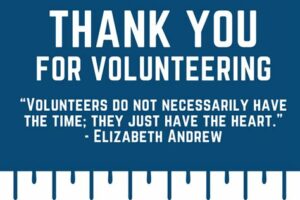Table of Contents
Looking for cover letter examples for volunteer work? Browse through our collection of professionally written sample cover letters tailored specifically for volunteer positions. Whether you’re applying for a community service, charity, or nonprofit organization, our cover letter examples will help you stand out and showcase your passion for making a difference. Start crafting an impactful cover letter today!
Volunteering is not only a fulfilling way to give back to the community, but it also allows individuals to gain valuable skills and experiences that can enhance their personal and professional growth. Whether you are a recent graduate looking to build your resume or a seasoned professional seeking a meaningful way to contribute, a well-crafted cover letter can make all the difference in securing a volunteer position. With that in mind, let’s explore some compelling cover letter examples for volunteer work that will captivate potential organizations and demonstrate your commitment to making a positive impact.
Introduction
A cover letter is an important document that accompanies your resume when applying for volunteer work. It provides an opportunity to showcase your skills, experience, and passion for the specific cause or organization you wish to support. Writing a well-crafted cover letter is crucial in making a strong first impression and increasing your chances of being selected as a volunteer. In this article, we will explore some effective cover letter examples for volunteer work.
1. Addressing the Letter
When writing a cover letter for volunteer work, it is essential to address it to the correct person or department. If possible, try to identify the individual responsible for volunteer recruitment. This demonstrates your attention to detail and genuine interest in the organization. If you are unable to find a specific name, addressing the letter to the volunteer coordinator or the organization’s general contact is also acceptable.
2. Opening Paragraph
The opening paragraph of your cover letter should grab the reader’s attention and make them want to continue reading. Start by introducing yourself and stating the position or type of volunteer work you are interested in. Briefly explain why you are passionate about the cause and mention any previous experience or skills that make you a strong candidate.
3. Showcasing Relevant Experience
In this section, highlight any previous volunteer work or relevant experience that aligns with the position you are applying for. Emphasize the skills you have gained and how they can contribute to the organization. If you do not have direct experience, focus on transferable skills such as communication, teamwork, and adaptability.
4. Expressing Interest in the Organization
Demonstrate your knowledge and interest in the organization by researching their mission, values, and recent projects. Explain why you are specifically drawn to their work and how you believe your contribution can make a difference. This shows that you have taken the time to understand the organization’s goals and are genuinely invested in their cause.
5. Tailoring Your Skills
When writing a cover letter for volunteer work, it is important to tailor your skills and experiences to match the specific requirements of the position. Read the volunteer description carefully and identify key skills or qualifications they are seeking. Then, highlight how your skills align with their needs and explain how you can contribute to their mission.
6. Sharing Personal Motivation
In addition to showcasing your skills, it is crucial to communicate your personal motivation for volunteering. Share a personal anecdote or experience that inspired you to get involved with the cause. This helps the reader understand your genuine passion and commitment, making you a more compelling candidate.
7. Closing Paragraph
In the closing paragraph, reiterate your interest in the volunteer position and express your gratitude for considering your application. Offer to provide any additional information they may require and include your contact information. End the letter with a professional closing, such as Sincerely or Best regards, followed by your full name.
8. Proofreading and Editing
Before submitting your cover letter, ensure that it is free of any grammatical or spelling errors. Poorly written or unprofessional cover letters can harm your chances of being selected. Take the time to carefully proofread and edit your letter, or consider asking a friend or mentor to review it for you.
9. Formatting and Length
Keep your cover letter concise, ideally no more than one page in length. Use a professional font and format that matches your resume. Ensure that your contact information is clearly visible at the top of the letter. Use bullet points or short paragraphs to make it easy for the reader to scan and grasp the key points.
10. Following Up
After submitting your cover letter and resume, it is a good practice to follow up with the organization. Wait a week or two before sending a polite email or making a phone call to inquire about the status of your application. This demonstrates your enthusiasm and proactive attitude towards volunteering.
Introduction to Cover Letter Examples for Volunteer Work
Cover letter examples for volunteer work serve as a helpful guide when applying for volunteer positions. These examples demonstrate how to effectively promote one’s skills, experience, and motivation to contribute to a cause or organization. By following these examples, individuals can craft a compelling cover letter that highlights their suitability for volunteer positions.
How to Structure a Cover Letter for Volunteer Work
A well-structured cover letter for volunteer work typically consists of an introduction, a body that highlights relevant skills and experiences, and a conclusion that reinforces the candidate’s enthusiasm for the role. By adhering to this structure, applicants can effectively convey their qualifications and dedication to making a difference through volunteer work.
Demonstrating Passion and Motivation in a Cover Letter for Volunteer Work
When writing a cover letter for volunteer work, it is crucial to communicate one’s passion and motivation for the cause or organization. By expressing genuine interest and detailing personal experiences or reasons for wanting to volunteer, applicants can stand out to recruiters and convey their commitment to making a positive impact.
Emphasizing Relevant Skills and Experiences in a Cover Letter for Volunteer Work
In a cover letter for volunteer work, it is essential to highlight relevant skills and experiences that align with the requirements of the volunteer position. By showcasing how these skills have been applied in previous volunteer roles or professional experiences, applicants can demonstrate their value and suitability for the specific volunteer opportunity.
Tailoring the Cover Letter to the Organization or Cause
To make a strong impression in a cover letter for volunteer work, it is crucial to personalize it to the organization or cause being supported. Researching the organization’s mission, values, and current projects allows applicants to align their skills and experiences with the organization’s needs effectively, showcasing a genuine interest and commitment to the cause.
Showcasing Transferable Skills in a Cover Letter for Volunteer Work
Even if an applicant lacks direct experience in volunteer work, they can still demonstrate their suitability through showcasing transferable skills. These may include communication, leadership, organization, or teamwork skills gained through academic, professional, or personal experiences. By emphasizing these skills in a cover letter, applicants can highlight their potential contributions to the volunteer role.
Providing Examples of Previous Volunteer Work in a Cover Letter
For individuals with previous volunteer experience, it is important to provide specific examples of their contributions and accomplishments. By highlighting the impact they made in previous volunteer roles, applicants can demonstrate their ability to take initiative, work effectively with others, and make a meaningful difference, making them a strong candidate for future volunteer opportunities.
Closing Remarks and Call to Action in a Cover Letter for Volunteer Work
In the closing section of a cover letter for volunteer work, it is crucial to reiterate one’s enthusiasm for the opportunity and express gratitude for the reader’s time and consideration. Including a call to action, such as expressing readiness for an interview or offering to provide further information, demonstrates the applicant’s proactive approach and eagerness to contribute to the cause or organization through volunteering.
As a professional with experience in reviewing cover letters, I believe that including examples of volunteer work in a cover letter can greatly enhance your application and demonstrate qualities that are highly valued by employers. Here are some reasons why using cover letter examples for volunteer work is beneficial:
- Shows dedication and commitment: Including volunteer work in your cover letter exemplifies your willingness to go above and beyond and contribute to the community. It demonstrates that you are not only focused on personal gain but also on making a positive impact.
- Highlights transferable skills: Volunteer work often involves tasks that require teamwork, communication, problem-solving, and leadership skills. By showcasing these skills in your cover letter, you can effectively demonstrate your ability to excel in various professional settings.
- Provides specific examples: Including volunteer work in your cover letter allows you to provide concrete examples of how you have applied your skills and made a difference. This gives employers a clearer understanding of your capabilities and potential contributions to their organization.
- Shows alignment with company values: Many organizations value corporate social responsibility and community engagement. By incorporating volunteer work into your cover letter, you can demonstrate that you share similar values and are likely to be a good fit within their culture.
- Displays initiative and proactivity: Volunteering is typically a voluntary activity, and engaging in it shows that you are proactive and take initiative. This can leave a positive impression on employers, as it indicates that you are motivated and willing to take on additional responsibilities.
Overall, using cover letter examples for volunteer work can be an effective way to showcase your commitment, skills, and alignment with an organization’s values. It allows you to stand out from other applicants and provides employers with a holistic view of your abilities and character. Remember to tailor your examples to the specific job you are applying for, emphasizing the skills and experiences that are most relevant to the position. Good luck!
Thank you for taking the time to visit our blog and learn about cover letter examples for volunteer work. We hope that the information provided has been helpful in guiding you on how to create a professional and compelling cover letter for your volunteer applications. As you embark on your journey to find meaningful volunteer opportunities, we encourage you to utilize the tips and examples discussed in this article to make a positive impression on potential organizations.
First and foremost, it is important to remember that a cover letter for volunteer work should highlight not only your skills and experiences, but also your passion and commitment to the cause. Transitioning from a traditional cover letter for paid employment to one for volunteer work requires a shift in focus. Instead of emphasizing your qualifications for the position, emphasize your motivation to contribute and make a difference. By doing so, you will demonstrate to organizations that you are genuinely dedicated to their mission and that you will be a valuable asset to their team.
Additionally, incorporating specific examples and stories into your cover letter can be highly effective in capturing the attention of readers. Whether it’s recounting a personal experience that inspired you to volunteer or highlighting a particular skill or accomplishment that is relevant to the volunteer role, these anecdotes can provide a deeper insight into who you are as an individual and why you are passionate about the cause. Remember to keep these examples concise and relevant, ensuring that they align with the organization’s values and goals.
In conclusion, crafting a cover letter for volunteer work requires a unique approach that goes beyond simply listing your qualifications. It is an opportunity to showcase your passion, dedication, and commitment to making a positive impact. By utilizing the cover letter examples and tips provided in this article, we are confident that you will be able to create a compelling cover letter that effectively communicates your motivation and enthusiasm to organizations. Good luck on your journey to finding meaningful volunteer opportunities, and thank you once again for visiting our blog!
.
People also ask about Cover Letter Examples for Volunteer Work:
What should I include in a cover letter for volunteer work?
When writing a cover letter for volunteer work, you should include the following:
- Your contact information (name, address, phone number, and email)
- The date of writing the letter
- The organization’s contact information (name, address, and email)
- A formal salutation addressing the recipient
- An introductory paragraph expressing your interest in volunteering and mentioning the specific position or program you are applying for
- A brief overview of your relevant skills, experiences, and qualifications that make you a suitable candidate for the volunteer role
- Specific examples of how your skills and experiences align with the organization’s mission or goals
- A closing paragraph reiterating your interest and availability for volunteering
- A formal closing (e.g., Sincerely or Best regards) followed by your full name and contact information again
How do I format a cover letter for volunteer work?
To format a cover letter for volunteer work, follow these guidelines:
- Use a professional font and font size (e.g., Times New Roman, Arial, or Calibri in size 12)
- Set your margins to 1 inch on all sides
- Align your text to the left and use single spacing
- Include your contact information at the top (left-aligned) and the organization’s contact information below it (left-aligned)
- Use a formal and professional tone throughout the letter
- Keep the letter concise and to the point, ideally fitting on one page
- Proofread for any grammatical or spelling errors before sending
Do I need a cover letter for volunteer work?
While not always required, submitting a cover letter for volunteer work is highly recommended. A well-written cover letter allows you to showcase your enthusiasm, relevant skills, and commitment to the organization’s mission, increasing your chances of being selected as a volunteer. It also demonstrates your professionalism and attention to detail.
Can I use a general cover letter for volunteer work?
While it’s possible to use a general cover letter for volunteer work, it’s more effective to tailor your letter to each specific opportunity. Generic cover letters may not address the organization’s needs and requirements, making them less impactful. By customizing your cover letter, you can showcase how your skills and experiences align with the particular volunteer role, increasing your chances of being considered.
How can I make my cover letter stand out for volunteer work?
To make your cover letter stand out for volunteer work:
- Research the organization and understand its mission, values, and goals
- Highlight any previous volunteering experience or related accomplishments
- Show enthusiasm and passion for the cause or program you will be involved in
- Provide specific examples of how your skills and experiences align with the organization’s needs
- Use a professional and engaging writing style that reflects your personality
- Avoid clichés and generic statements; be authentic and genuine in your approach
- Proofread carefully to ensure there are no errors or typos






